We get countless questions about having kids via surrogacy, so we’ve decided that we need to share the process we went through and our best tips for ensuring that the surrogacy process is as seamless and safe as possible.
Having kids is a huge step in life, let alone when it involves people from outside of the nuclear family and the law, but our simple guide to having kids via surrogacy and our own story will be exactly what you need to feel comfortable making the first steps towards building your own family.
We are NOT lawyers and no element of our experience should be considered as legal or medical advice. Please seek out a practicing family lawyer in your COUNTY that has RECENTLY worked in surrogacy cases for any consultation or procedural advice.
Before we dig into our family’s story and how we came to be the fun crew we are today, remember that having kids via surrogacy is a strange and bumpy path, particularly for people living in places with either very conservative laws or health systems that aren’t as progressive as ours in Washington State was. Know that our situation is very different from most surrogacy/family building stories you’ll read, and take our experience with a grain of salt, as it’s not the norm, but our journey is VERY applicable to nearly any family looking to grow by having kids via surrogacy.
We were very fortunate when it came to building our family. The opportunity fell in our lap and today we’ve got two amazing little boys! Every step wasn’t perfect though. Surrogacy for gay parents, and any couple unable to conceive/carry their own kids, is a very important option and hopefully our story will show how this one particular path can work out.
**Please read to the end, as there’s more than a warm fuzzy moral. And this is all about the process and obstacles we faced in having kids via surrogacy, so sorry for being short on pictures.
Starting the path to having kids via surrogacy
So, how do you have kids via surrogacy? Is it super complicated? Where do you even start? Here’s the scoop of “How To”.
Note: our family journey was through gestational surrogacy which is based on the birth mother both donating her own egg AND carrying the child. There are several forms of surrogacy, so as you consider your own process of having kids via surrogacy be sure you’re approaching the process per your local laws and avenues.
Step 1: Talking about having kids… at all.
One day a friend casually mentioned that she had a cousin who had been donating eggs and now was interested in carrying a child for a couple. “Would you be interested in something like that?” Um. We hadn’t talked about it more than random comments about having kids, never actually discussing it in any detail.
So, we talked and then met this person, this surrogate, not fully understanding what/why she wanted to do this. She was smart, caring, wise, and beautiful and had no ulterior motives. Amazing. And she liked us (thank goodness). Apparently wonderful people with visions of unlimited possibilities are thinking about surrogacy for gay parents even when the potential dads (and moms) aren’t. Just one of the amazing discoveries we had in our journey of having kids via surrogacy.
Our own discussion about having kids in general looked like this:
- “Do we want to be parents?” – yes
- “Are we fit to be parents and have the resources to do so?” – yes
- “Do we have the support network to have kids via surrogacy?” – yes
- “Are we willing to face the questions and haters we’ll come across?” – ummm… I think so. (yes)
- “Can we afford to adopt and if so are there smooth options for us?” – no and after researching, nothing seemed attainable.
Note that we researched many types of adoption and none seemed to be accessible to us as gay parents or to be doable in a foreseeable timeline. In retrospect, foster-to-adopt may have been an option for us, but still without the level of certainty we were comfortable with. Having kids via surrogacy was the best, and in some light, the only option for us to start building our family at the time.
Things to Consider about Becoming Parents
First off, it’s okay to not become a parent in your lifetime. There may be a lot of pressure in your world to become a parent, but YOU need to be the one to want it. Bringing a child into your family, whether through surrogacy, adoption, or basic human reproduction actions, is an enormous life-changer. It used to be that people would start having kids right away when they got married, but that’s changed.
Deciding about Work vs Stay-at-Home Parenting
It’s okay to want to live more without the element of becoming a parent. And it’s okay to enjoy you work and creative ventures. Pursuing your life dreams, no matter what they are, is absolutely fine and is NOT a selfish way to live.
When you become a parent, work and creative projects shift a lot. Whether you don’t go back to work once you have a child in your family or if you balance having a workplace-job with having a parenting-job in separate spaces, things will shift. It’s okay to want to keep working at a paying job when you become a parent, but for some that desire changes or just isn’t possible initially.
No matter what you choose you want to do, return to the workplace or stay home and full-time parent, you need to have a plan about what’s going to be right for your family initially. No doubt what you and your partner (or you on your own) feel will morph over time, but have a plan and stay flexible as you approach day 1 of becoming a parent.
Accepting Life Changes
Bringing home a child doesn’t just mean that one day you’re all of the sudden a parent, but having kids means that you’re choosing to share your life and world, your home, with another being and YOU DON’T KNOW THEM! That’s right. When you have a baby or adopt, you’re welcoming a stranger into your home. Your job from that day on is to give of yourself and help them learn how to be a good person who makes the world around them a better place. You don’t know if teaching that lesson and sharing your life will be easy or not.
Accepting life changes, such as shared space and time, can be very difficult. While there’s truly no great way to prepare for it, you want to consider and talk about what will be different in your world. If you struggle to accept that life will be less perfect on the surface or that you’ll have to compromise EVERYTHING going forward, it may not be the right time to become a parent. Yes, you can massively shift your way of thinking over time, but if the thought of it is too much, take more time to get to a good place before you become a parent.
Changing Family and Friend Relationships
One other major life change to consider is how others’ roles will change in your life. Your own parent may take on a totally new persona you’ve never seen and may drastically change how they want to be involved in your life. The same goes for other family or friends. Many may see you as bringing a baby into THEIR lives. That’s okay, but know that as you start to see these behaviors and commentary start, you need to discuss with your partner what sort of boundaries may need to be set for everyone’s relationships and sanity.
Having a baby via surrogacy is interesting in that you may have this other person carrying your child who you become very close to… or maybe it’s all professional and there’s no interaction really. Knowing that the surrogate may be a part of yours and your child’s life going forward is something to consider. We are best friends with our kids’ birth mother, so we’re thrilled about the relationship we’ve cultivated over the years, but not every family and not every surrogate is like ours. Accepting a new person in your world and having their eyes on you, purposeful or not, is something to be aware of.
Step 2: legal surrogacy things to consider
It’s not every day you strike up an agreement with somebody to create a life and then hand that life over. Where do you even begin?
We started the legal steps of setting up our surrogacy situation by researching online all of the different types of surrogacy and adoption methods. Naturally, we met with a family law lawyer and she gave us instructions and reviewed our potential Gestational Surrogacy contract. Having kids via surrogacy seemed to be very unusual to the lawyer we met with, but she was still confident in the process we were to follow.
- Her instructions: have contract notarized, have baby, complete Secondary Parent Adoption. Cool, easy. Having a baby via surrogacy was going to be a piece of cake.
If you’re unfamiliar, secondary parent adoption is what happens when a new spouse is added to a family and they want to legally become the secondary parent to a child, such as a step parent. Our goals and understanding were that we could both be primary parents from the birth of the child, which is why surrogacy was the right option for us. The advice of the lawyer we met with was wholly inaccurate and WAS NOT what we needed to do to become dads via surrogacy.
- Actual legal steps to take: contact your state/province’s Department of Health or Family Services to have them specifically advise you to the local laws and processes specific to your situation. Having kids via surrogacy can be handled very differently by region.
Tips for Finding GOOD Legal Surrogacy Information
Google it. And I don’t just mean to Google surrogacy and see what the New York Post is serving up, but I mean to search for legal requirements for the type of surrogacy you’re working on in your area. It may very well be that different types of surrogacy are not legal in your area. For example, gestational surrogacy without compensation may be legal, but then traditional surrogacy with a stipend may be against the law.
The best resource for finding out the specifics of legal surrogacy in your area are to go directly to the county or state/province Health Department. The Health Department is who deals with many elements of family law, including births and records. If we had been told that before beginning the legal process of surrogacy with our oldest son, it would’ve saved us both a lot of hassle and heartbreak.
Having a Lawyer Start the Surrogacy Process
“Can’t I find a good family lawyer and let them lead the process?” Great questions and NO. Here’s why:
- While helping people may be at the heart of a legal practice, it’s still a business
- laws, statutes and precedents may change, updating with the Health Department first
- A lawyer may be well versed in current laws and practice around surrogacy, but they MAY NOT BE NEEDED.
You may be able to save yourself thousands of dollars and countless hours depending on the type of surrogacy you’re doing by going directly to the Health Department first. While ultimately you may need a family lawyer to draw up a surrogacy contract, advice on the actual process and legal requirements starts with and lives with the Health Department.
If you are working with an agency to be paired up with a surrogate, it’s very likely they’ll have a contract to operate off of and that will meet the guidelines of the region your surrogacy process is happening in. Even in that case, you still want to do the footwork with your local health department to make sure you understand the process and what the role of an agency may be in your becoming a parent.
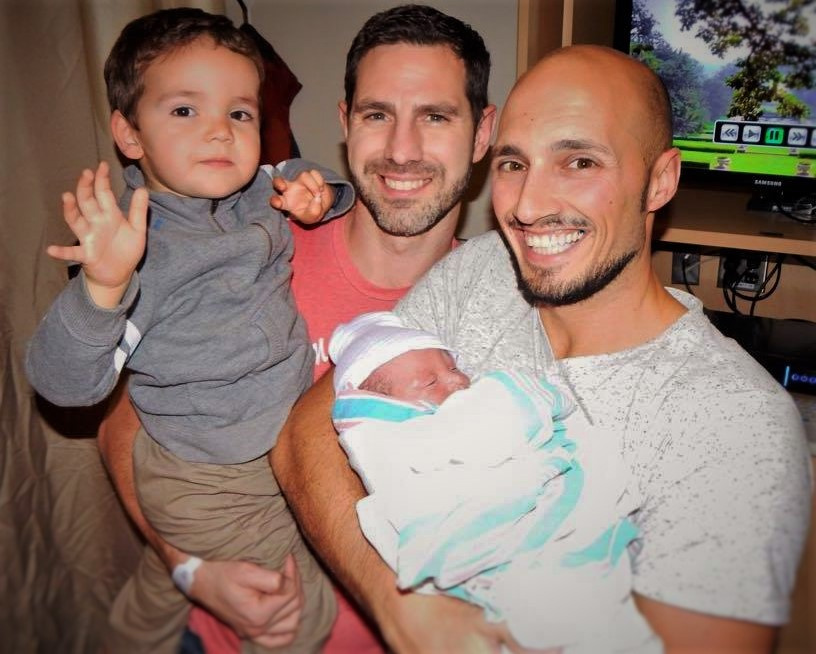
Step 3: Becoming Pregnant via Surrogacy
Now to become pregnant. We hadn’t been saving up for years to have a baby through IVF or something clinical, which truly is very costly. We also found out that most reproductive clinics would not work with couples and surrogates where the birth mother was also the egg donor, which is known as a Traditional Surrogate.
After some discussion and research about medical options and reproductive sciences, we thought “we’re pretty chill people,” so we went with the home method. It worked and boom: life was growing! While initially it seemed strange to us that we were creating a baby through the home method, the comfort of home and few people we had to explain our situation and process to, it was the right choice for us.
When you’re initially looking for a surrogate to help you become parents, chances are that they will have an idea of the process they want to go through before you even meet or talk about it. The process of becoming pregnant is very nuanced and it’s important everyone is comfortable with it. Always be open when you’re figuring out things like this, especially if you’re finding a surrogate yourself versus going through an agency.
Important Discussions to Have With Your Surrogate
It’s very likely that before you get pregnant and surrogacy is happening in full force, that you’ll have a clearly written and signed contract in place. Some of the contract will sound very legal and some will be very personal. While the personal aspect of surrogacy can vary greatly depending on the woman carrying the bay and the prospective family’s relationship with her, there are still some basic discussions to have aloud together.
First topic to discuss with your surrogate – How many attempts or how long do you collectively want to try to conceive a child? Just like with a couple trying to conceive in the traditional method (bow chica bow wow), the “turkey baster” method can take time and many attempts. It’s not guaranteed to work for every family. While together you may choose to keep trying if a baby isn’t conceived right away, you should set a limit to how long you pursue a method.
Next topic to discuss with your surrogate – If one method of attempting conception doesn’t work, do you want to try another? An example of this may be if you’re trying the home method and it’s not working, do you have the ability and is the surrogate willing to try IVF. The goal of having a baby through surrogacy is to build your family. Be ready to discuss what options are viable and have backup plan.
The last, and maybe most important topic to discuss with a surrogate – How involved do you all want to be in each others’ lives in the future? For us this was an easy talk because we already were good friends and in each others’ lives even without a child, but even in our situation we established our roles. It was important to us that it was clear that we were the parents 100% and that all decision making live with us. Even though that probably could’ve gone without saying, it was important to establish that the relationship between our child and their birth mother was not to be confusing, for them or us. We’ve been very successful over the years at being in each others’ lives without overstepping or taking advantage or each other.
Surrogacy Pregnancy Process and Progress
We were very involved with the actual pregnancy for both our kids. We attended check ups at the OB clinic and did classes, just like any new parents would do. We got to participate in ultrasounds and have access to our doctor for questions and concerns, just like any new parents.
Being present and being there to support the birth mother was very important to us. Surrogacy is a very emotional process, for both the woman growing the baby and for the parents who are watching from a distance. Getting to participate in appointments and milestones was very special and I like to think that it helped us all get ready for the big day that the baby would come home with us, not our surrogate.
There’s an unimaginable amount of trust that goes into having kids via surrogacy. The prospective parents trust that the surrogate won’t change course or make unhealthy decisions. The surrogate trusts that the new parents will love and care for their child and build a connection just like traditional birth parents would. Participating in as many aspects of the pregnancy as possible helped up all establish that trust together.

Step 4: Announcing You’re having Kids Through Surrogacy
When you never ever have given becoming a dad a second thought because you didn’t think it was possible, you have never thought about how to tell people or what anybody might say about you becoming a parent. Well, we started by telling the OB/GYN and making sure she was the right fit for our situation, and she certainly was. Since she was good to go and baby was growing and healthy, we could tell other people.
We told family next, and then select friends. Friends were so excited and surprised and had so many questions, appropriate and not. Family: some were thrilled beyond belief, others were silent and then just said “How is this happening?” Some were outright cruel. I wasn’t prepared for that.
In my mind the only response to give when somebody shares such incredible news as having a child is just to smile and hug and be excited for them. I didn’t think telling anybody would make me reel back and question myself, either as a mature adult or as a fit parent. Then I realized the rule of the world: haters gonna hate. Life is full of surprises around every corner, especially when it comes to having kids through surrogacy. And especially when you’re gay and tell people you’re going to be a dad.
When to Tell People You’re Having a Baby
This is another thing to talk to your surrogate about. Each pregnancy is very different and carries its own risks. Include your surrogate in the discussion about when to tell friends and family about the pregnancy. Some people may recommend waiting until 20 weeks to share the news, while others will recommend even longer. Work together to ensure everybody is aligned, even if the surrogate isn’t a close friend who’s a part of your daily life.
In a world of social media and instant gratification, it’s easier than ever to share news with people. Consider though how people receive news like this, and think about if you want to be in person to share the joy. Ultimately, it’s going to come on on Facebook or Instagram that you’re going to be a parent, but that shouldn’t be the primary announcement. Here’s why:
- social media algorithms don’t show everything to everyone.
Somebody important will be missed, feelings hurt… and then you have one less babysitter for a future date night. In all seriousness, something as major as bringing a new person into your family is an important conversation to have live. If you assume social media will do its thing like it does with cute cat videos that everyone’s seen, you’re wrong.
Fielding Questions About Having a Baby Through Surrogacy
Yes, you’re going to get lots of questions. While a traditional conception doesn’t come with questions like “What position were you in?” or “How often did you guys have sex?” being an LGBTQ couple going through surrogacy seems to have no boundaries. Yes, there will be questions of every sort, by friends and strangers alike. Yes, you will be so uncomfortable. Yes, you may react very loudly and publicly to somebody’s comment or question about being gay and having kids… It’ll all happen.
Here are some easy tips to prepare yourself for answering questions about being a gay parent having kids through surrogacy:
- Decide what level of details you are okay sharing
- Talk to your surrogate about how private SHE wants the pregnancy information to be
- Discuss together where the line of inappropriate questioning is.
Examples of inappropriate questions that we heard from day one of announcing our first child through today when we meet new people include:
- “How did you get pregnant?”
- “How did you get a baby?”
- “Who’s the father?” or “Which one of you is the dad?”
- “Does the mom know that she’s giving up her kid?”
- “What will you tell your kids about who their parents are?”
- “If there’s a medical problem, how will you know if there’s a history?”
- “Did you just mix everything up? Whose sperm did you use?”
- “Don’t you worry about them growing up without a mom?”
- and the worst question of all: “Aren’t you worried about your kids growing up to be gay?”
I could go on forever about the inappropriate questions we get as gay dads, let alone as parents who didn’t carry their own kids. People will shock you, but you can stay sane and safe by establishing what sort of inquiries you’ll acknowledge before they start coming your way.
Questions we DO answer and will talk about with friends or strangers are the same. Nobody needs any more info than anybody else about our family. Here are just a few questions we will actively answer about having kids via surrogate:
- “Do the kids know their birth mother?” – yes
- “Did you find out what gender they were before they were born?” – no
- “Is life so different with kids?” – yes
- “Did you always know you wanted to be a dad?” – no
There are very few questions beyond these that we will answer, to friends or strangers. Building a family is a very private life event and nobody needs to know everything, including many of the struggles prospective parents face.
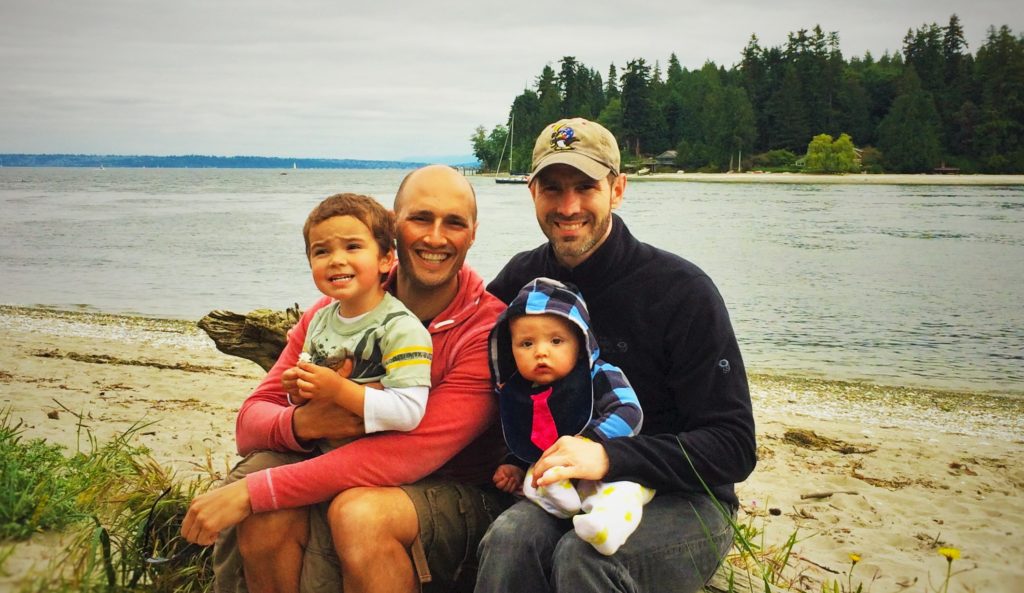
Step 5: Birthday!
Simple enough. You know, get waken up at 12:55 am, rush through the house like a crazy person and drive (safely) to pick up our surrogate. It went perfectly…except the speed bumps in the parking lot. Yeah, let’s just say I’m glad her water didn’t break in the car. We checked into the maternity ward and our OB was actually there to deliver and we welcomed a little boy.
He was such a surprise; came out peeing and we were all crying and cuddling and crying….
Tip: Plan ahead for the birth event. Having a good birth plan with details about getting to the hospital and a phone tree is very important. When you’re having kids via surrogacy, you might not know everybody you need to contact on behalf of the birth mother, so be sure to have that information and plan prior to delivery day.
Who Should Visit at the Hospital
You’d think that not very many people would want to voluntarily go to the hospital, but when there is a brand new baby, people are SO EXCITED. Before Oliver’s arrival (our oldest) we made a list of friends or family we would invite to meet us at the hospital. The list was short and included only a few friends and family members. Very few. And we were sure to run it by our surrogate in advance just in case there was anybody she didn’t want there or that might have been odd to have around.
We also tried to space things out with texting people invitations to visit so that there wasn’t a crowd at any time. That kind of worked, but luckily people knew to not hang around forever.
Note: if you’re concerned about anyone visiting you that will upset you or your surrogate, tell the reception desk and they’ll be sure to not let them though. Maternity wards are amazingly secure, so there’s virtually no risk of anyone showing up in your room that shouldn’t be there, but for the added peace of mind, let the desk know if you have any concerns. Let your special delivery day be simple and stress free.
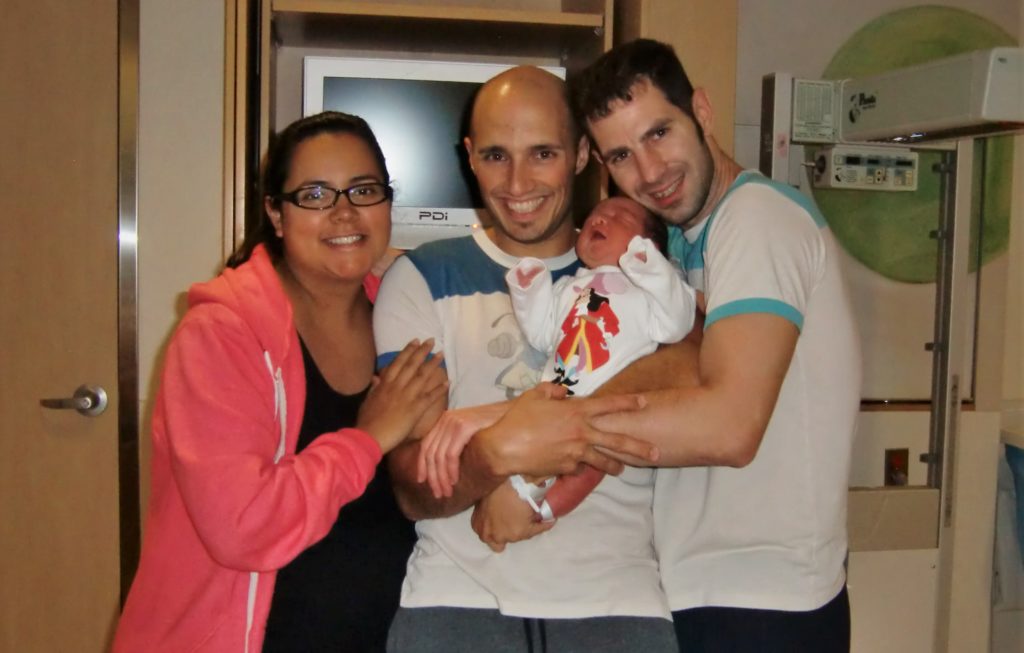

Step 6: Filing Birth / Surrogate Paperwork
We made sure ahead of time that the hospital’s lawyers and social worker were aware of our situation of having kids via surrogacy and they were good to go with it. We brought everything legal we had just in case and things were set up perfectly… and then the Vital Statistics clerk came in.
If you’ve not had a child in a hospital, this is the person who completes the paperwork for the Social Security Administration and starts the birth certificate process. She came in, saw us and immediately began questioning us, questioning our surrogate that she was sure everything was in order and was not comfortable with us. She left to make some calls, came back, questioned us more, gave us more paperwork and then before leaving made sure to tell us that she disagreed with our process and that the birth certificate still would have just the birth mother’s name on it.
No. Just no. After feeling sufficiently dampened and attacked on our big day, we moved past it and got to leave. Even as we left the hospital, we had to leave as a clustered group to show that we weren’t taking the baby away from our surrogate.
MUST DO: be sure plenty in advance that the delivery hospital has reviewed the appropriate documents and legal stuff so there are no hiccups in delivery or leaving the hospital. We did this, but an individual made it difficult in the moment.
Once home, we processed the paperwork as instructed and received an inaccurate birth certificate. We waited to complete the Secondary Parent adoption (see lawyer instructions above) because we knew that there’d be one more little person eventually. Two years later we were pregnant through surrogacy again and went through all the same steps.
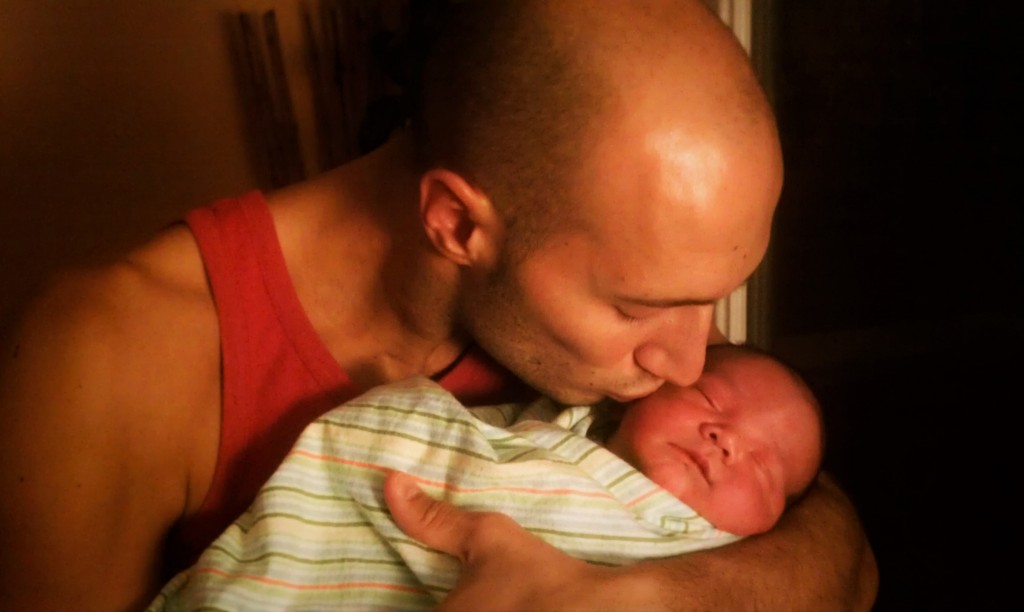
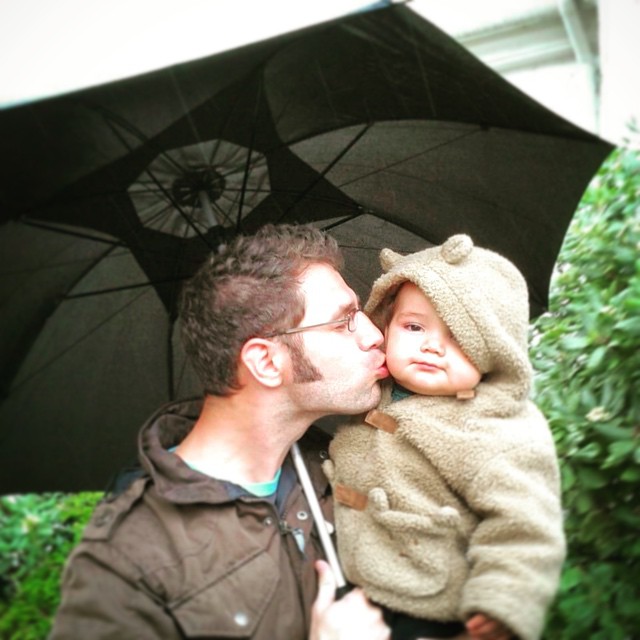
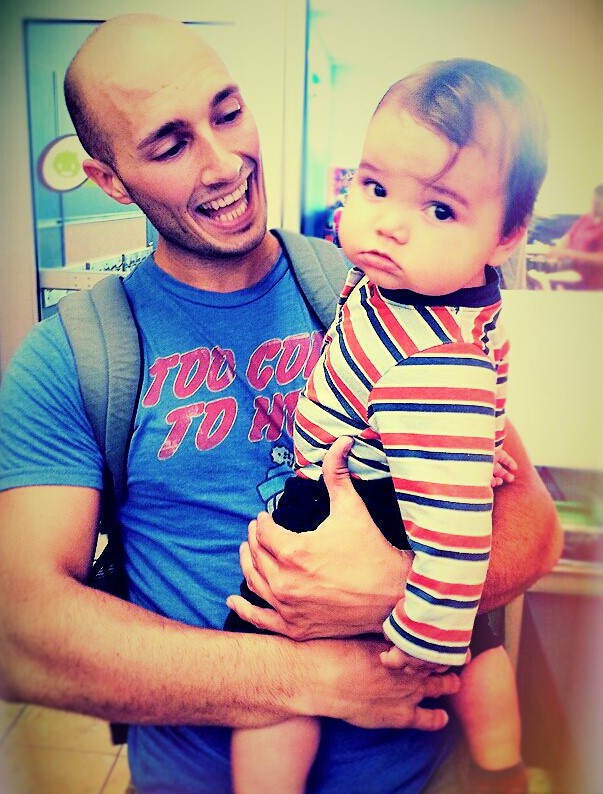
What was different with our second surrogacy experience
Our entire process for drawing up the necessary surrogacy documents and becoming pregnant was the same as our first time. We had the same OB/GYN and delivered at the same hospital.
The only difference was that Taylor baby No. 2 was born the evening before Thanksgiving. We would be celebrating with a hospital cafeteria turkey feast and a newborn baby. This also meant that the hospital had a bare-bones staff level, meaning only the absolutely necessary staff was there.
Our nurses all knew what to do to get us out of there just like they would do with any other family. They gave us the appropriate paperwork and cute baby footprints… but there was no Vital Statistics clerk like before (we were okay with this). We were given some paperwork that seemed right and a phone number for the Department of Health to ensure that their records were appropriately updated.
Okay, that’s new.
Actually, it wasn’t new. Upon contacting the Department of Health after the holiday, we got a call back from somebody who worked with surrogacy specifically. He said that he just needed to get a copy of the surrogacy agreement to update the names on the birth certificate… and that’s it.
Wait, what?! Really?
I called him back and thoroughly explained our whole situation, starting three years prior and he repeated, “Yep, please just send me a copy of the contracts and the birth certificates for both kids when you get the newest one. I’ll update them all.”
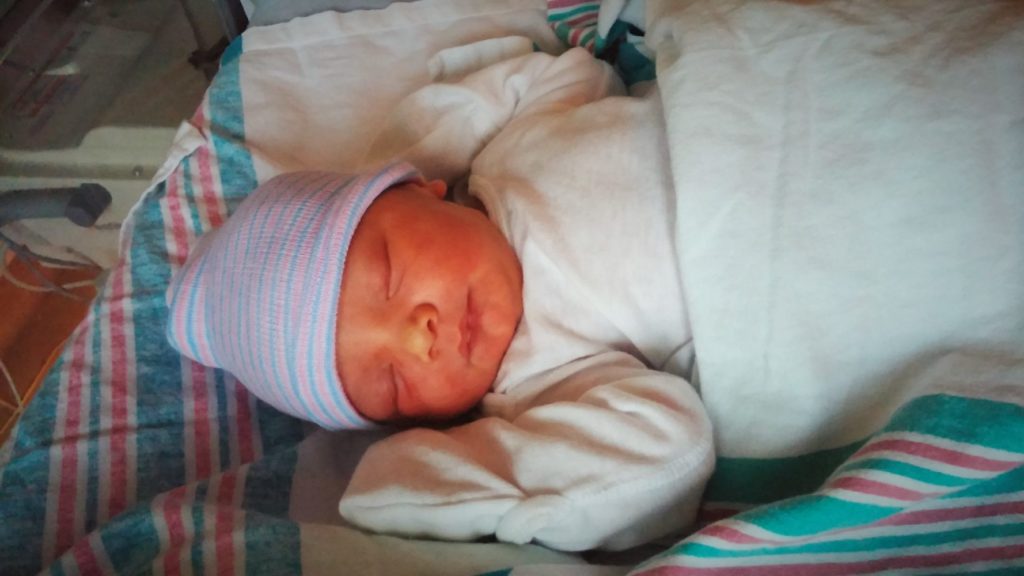
I’m not one to question a good thing, but I am one to go back and question if something else had bad blood behind it. I asked if there was a change to surrogacy or family laws in the last few years that made the process so different. The man told me that there have been no changes and it seemed that the clerk at the hospital provided wrong directions and completed the process incorrectly.
“So we don’t have to go through any sort of adoption? At all?”
“No, that’s why you have a surrogacy agreement.”
“So our lawyer and the hospital lawyer were wrong?”
“That’s correct.”
“And nothing’s changed in the last few years, legally?”
“Correct. Nothing was done correctly from the start. Send me the paperwork and I’ll fix it.”
Sent. Fixed. We soon after received birth certificates with our names on them. Us. The 100%-legal-from-the-start parents.
MUST DO: from the very beginning of having kids through surrogacy, be sure that you’re following the steps and being compliant with the state. Legislation and local laws may change, and because surrogacy is not at the forefront of common law discussion, many lawyers, including traditional family lawyers, may not be up to date on current requirements and processes.
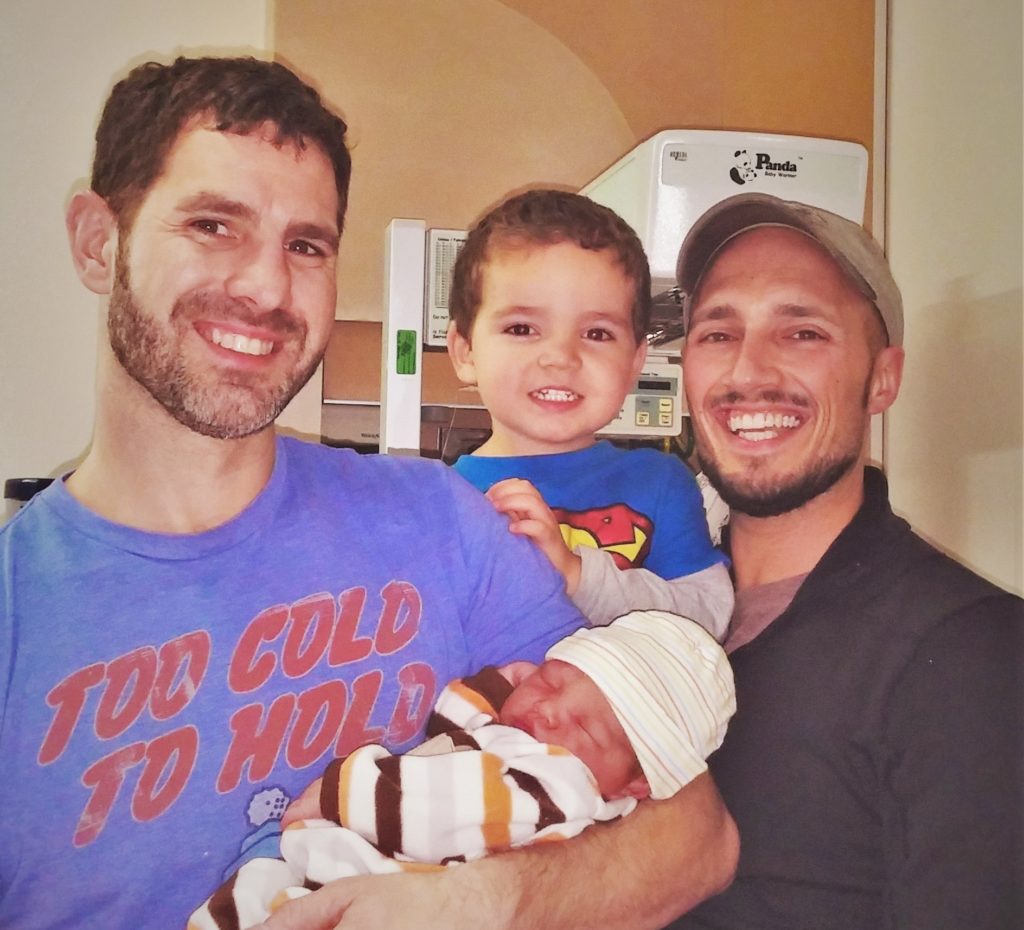
Learn From Our Surrogacy Experiences
Other couples will face much more difficult or multi-layered battles than we faced as they work on building their family. If somebody had shared accurate information or been willing to do the job they’re paid to do from the start, we would never have had to face the opposition and stress that we did. We could have enjoyed the whole birth experience without feeling like an incomplete family or been given the run-around.
If we had been given correct information from the start, we could’ve skipped hours of phone calls and exposing our personal information to strangers that never needed it to begin with.
The Moral of our Surrogacy Story
Go through the surrogaccy process the state or province directs you. Work with those who maintain family records and deal with like situations daily. If you’re going through an agency, do your own due diligence with the Health Department.
Push back. Get clear answers and clear guidelines from those who manage the process.
Don’t lose hope. There are incredible people, such as a social worker or Department of Health clerk, who can and will help.
Even though the road may be long and bumpy, don’t be discouraged. Create the family you never thought possible. Two dads, two moms, one of each, fly solo… There are so many types of families. All a baby needs is a loving home to welcome it and a family willing to do the work. The other pieces will fall into place.

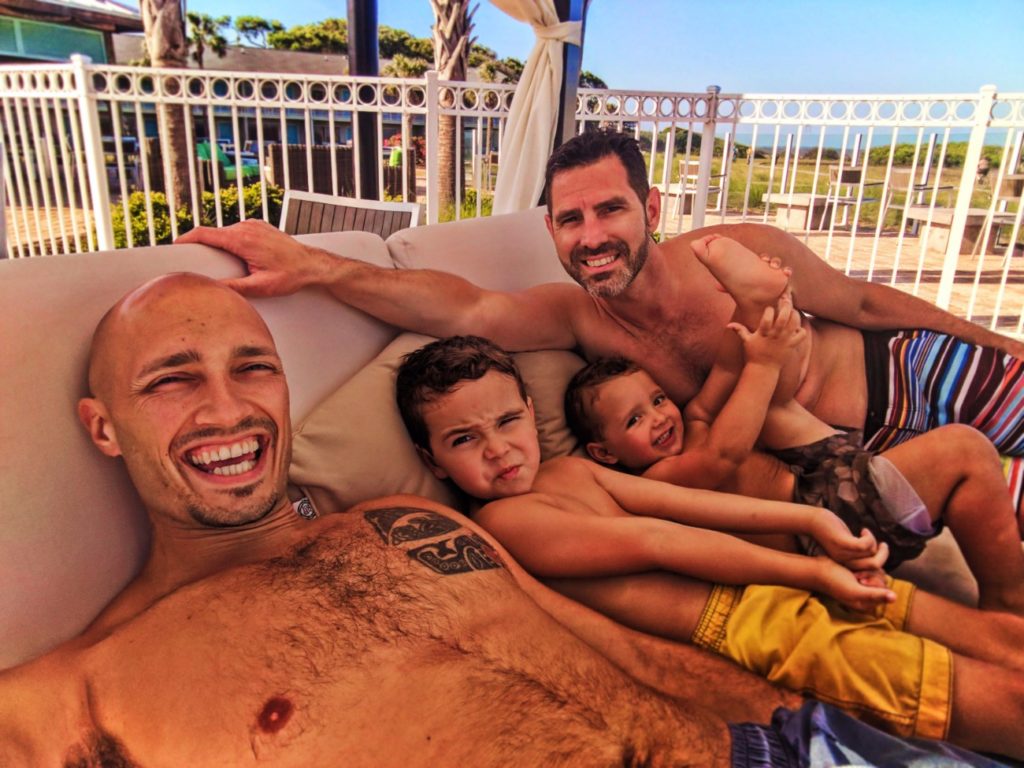


Do you know somebody who’s on the path to parenthood outside of the traditional nuclear family? Share our story about having a baby via surrogacy or direct them to our site. We’re happy to be a resource or an encouragement where needed.




Amazing story thank you for sharing
Happy to! And thank you. Not many of our friends or family knew what happened or what we faced. It’s good to share now.
What a great post! Thank your for sharing your story. Your family is beautiful! xoxo
Thank you! We are so thankful for the boys and can only keep working on making the world better for them, as we just know that they’ll face some obstacles in the future.
What a lovely family. The post is wonderful. Thanks for sharing!
Sharing is the best way to help others who are getting ready to face this too. And surrogacy faces judgement for gay and straight families alike.
So glad that it worked out for you. Thanks for sharing your journey.
Aw, reading your story gave me chills. So precious.
Incompetent people suck. Bad. I’m sorry you guys were put through all that mess the first time around.
Thank you. Yeah, it made the discovery of the actual legal process when working with the state that much sweeter! That’s life and we can only just keep working through it.
Fantastic how this all worked out for you guys. I can’t believe how giving and selfless your surrogate is. What an amazing thing to give someone. I’m glad it all worked out. Gives hope to other couples.
Great story Rob! I will admit that I was curious but didn’t want to ask. So happy for all four of you!
OMG, ask anything. We’ve been asked every question imaginable. If we don’t want to share a particle facet of something, we’ll say so. There have been a few people that we’ve given blank stares to and shook our heads and said repeatedly “Yeah no, we don’t share that…” And we’ve had to say it over and over. 🙂
Thank you for sharing such a personal and amusing story. So glad to hear it worked out and what an inspiration for other couples 🙂
That meant to say amazing not amusing! Stupid autocorrect :-/
“All a baby needs is a loving home to welcome it and a family willing to do the work.”
This is so compelling! I actually had no idea how the legal part of surrogacy worked! Thanks for sharing.
This story made me cry. I never knew. Thank you for sharing. Love to you both and your beautiful family ♡
An inspiring story that shows how we can overcome the odds and others’ opinions when we really want something in life.
Thank you for sharing this experience.
Amazing story and a beautiful family! Thanks so much for sharing.
I loved your story – your courage, your determination and your focus. Thank you so much for sharing it. 🙂
Oh my goodness. You must get so many questions about the “home method”.
This is awesome. Your family is beautiful.
Amazing story, thank you so much for sharing it and showing your beautiful family to the world! It must have been really hard at times but I am sure this experience can be of inspiration and support to others, like the rest of your adventures with your super cute children!
We were really fortunate to not have to face more trials than we did. Hopefully people see our story and realize the possibilities that are out there.
I loved, loved, loved this story. Thanks for sharing as I have never known any “dads” to go through this. Beautiful and what luck you had in finding this lady that shared her life with you.
She is the most incredible person. And we are happy to share our story.
What a great story! Glad everything worked out for you and now you have two beautiful boys!
What a touching post, admire your resilience and indomitable spirit, thanks for sharing, it is so inspiring.
Such cute kids, thanks for sharing 🙂
It is such a beautiful description of what all transpired! Incredible!
Sorry to hear the stress you had to go through but happy to see that everything worked out in the end!
Thanks for sharing your beautiful and amusing story with us. It’s inpiring
I think it’s so great surrogacy is legal and seems to be well-accepted in the US. I’m afraid in Belgium we’re still faaaaar from accepting it… Too bad, it creates so many chances and hapiness for so many people!
Great story! Its so amazing how much happiness and love surrogacy can given to people. And so great that people are willing to help! Its great that you have been so honest in sharing this!